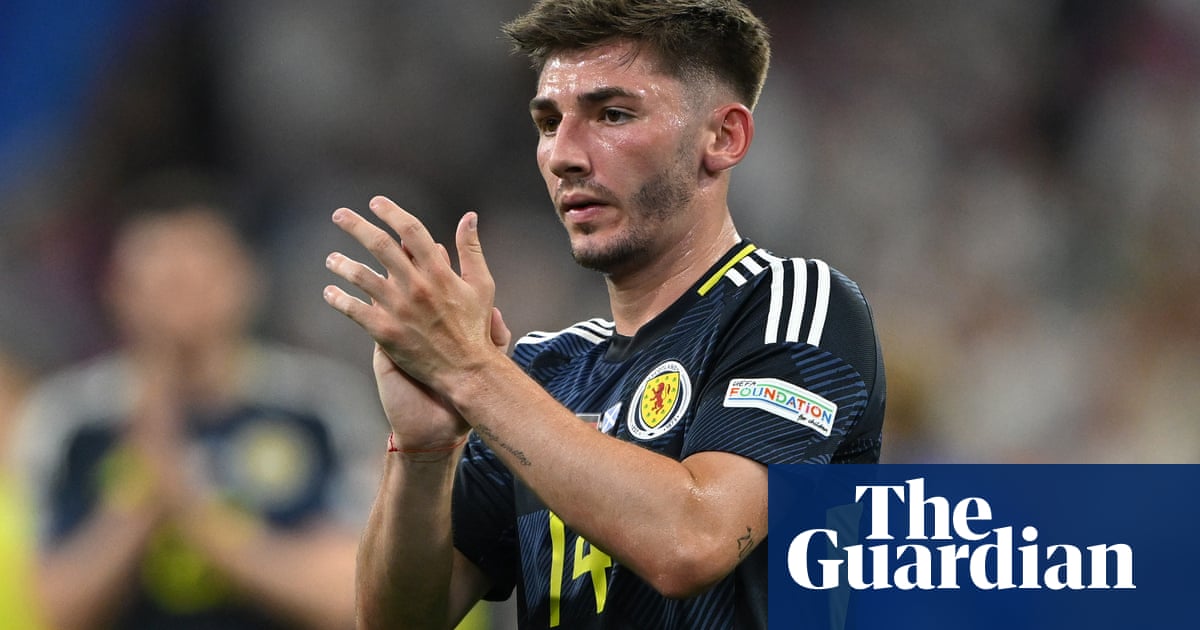If it was hardly difficult to pick holes in Scotland’s approach against Germany, one selection issue has dominated discussion. Steve Clarke’s decision to leave Billy Gilmour among his substitutes at the outset of the 5-1 rout against the Euro 2024 hosts turned heads. As Scotland failed to impose themselves in midfield, the Gilmour question grew louder and louder.
“It is impossible to answer,” Clarke said when asked whether not picking Gilmour from the start felt like an error. “In a 5-1 game where we were never in the game, is one player going to make that amount of difference?
“Maybe by talking about Billy in that context we are just putting too much pressure on him. If he is selected for the next game, let him go into it with a clear head. It is difficult. You can say what you want and I can say that I don’t think it made a difference. You can say: ‘Yes it did make a difference,’ and we will never know.”
Clarke is correct to raise the point about overemphasis on Gilmour. Scots get wildly excited about the former Chelsea player, such is the desperation for youthful talent. The 23‑year‑old enjoyed a fine season for Brighton and shows composure beyond his age. Yet Gilmour is no gamechanger and essentially no match for the Germans who swatted Scotland aside.
Things should be slightly softer for Clarke on Wednesday. The meeting with Switzerland in Cologne is among the biggest of his tenure, given defeat would almost certainly end Scotland’s tournament involvement with a game to spare. With criticism over the Germany debacle still ringing in their ears, Scotland need to offer a response. Clarke railed against the suggestion his European Championship starts now. “No, it started on Friday night,” the manager said. “It just did not start very well.”
Clarke concedes “maybe” his squad has lost an element of belief. “But it is time to get that back and we don’t have long to do that. That’s about working on the mind and making sure we have everything correct in terms of tactics and bodies on the pitch and how we play and that might just give them that bit of belief.
“Obviously we want to start the game really well because we did not start the game really well the other night. All these little things can add up. It does not take long for the confidence to come back to a professional footballer who knows he’s a good player. If he is a little bit down, a little bit hesitant and we start the game well and we do something good, then we’ll be fine.
“Because the vast majority of us have been together for so long it does not take much to remember what we are trying to do and how we work. We work quite well together. If we didn’t work quite well together I would not be sitting here and somebody else would be taking the team.”
It will be a surprise if Clarke does not turn to Gilmour. He has a decision to make over his right wing-back, given the torrid time Anthony Ralston endured on Friday. Scotland should consider a departure from their standard approach of deploying a single striker; Manuel Akanji, the Switzerland centre‑back, needs more than one player to occupy him. Clarke also has to ponder whether to man‑mark Granit Xhaka, Switzerland’s influential playmaker and captain.
“I liked him when he was at Arsenal,” Clarke said. “Obviously he went to Leverkusen and he has found a good way of playing in a really good team. He has had a fantastic season and he will come here with 100% confidence. We have to make sure he does not dictate the game in the way we allowed Germany to dictate the game. He is a very good player. We just respect him.
after newsletter promotion
“We need to get close to all the players further up the pitch because if we don’t get close to the players further up the pitch you end up doing what we did the other night, defending on the edge of the box.”
Not that Clarke views the Swiss as anything approaching no‑hopers. He has suggested Scotland should try to emulate a team who have become regulars in the knockout phases of the European Championship and World Cup.
“I watched them in qualifying and they were OK,” Clarke said. “They did enough to qualify. But they come here and immediately … you sort of forget Switzerland a little bit. But they are serial qualifiers and pretty much always in the last 16 or the last eight.
“They know how to do it. They know what to do. They have a really strong spine through the middle of the team and they have pace up front. It will be a difficult game.”
